The Role of Free Media in Shaping Public Opinion and Democracy
VerifiedAdded on 2020/02/23
|5
|1075
|32
Essay
AI Summary
This essay explores the significant role of free media in shaping public opinion and strengthening society, emphasizing its function as a cornerstone of democracy. It discusses the media's role in holding government accountable, publicizing important issues, educating citizens, and fostering connections among people. The essay highlights the challenges of free media, particularly in providing balanced and accurate information. It examines the impact of media portrayals, specifically focusing on the negative representation of Muslims in Australian media following the 9/11 attacks, and how this affects their social and individual recognition. The essay references various academic sources to support its arguments and provide a comprehensive analysis of the subject.
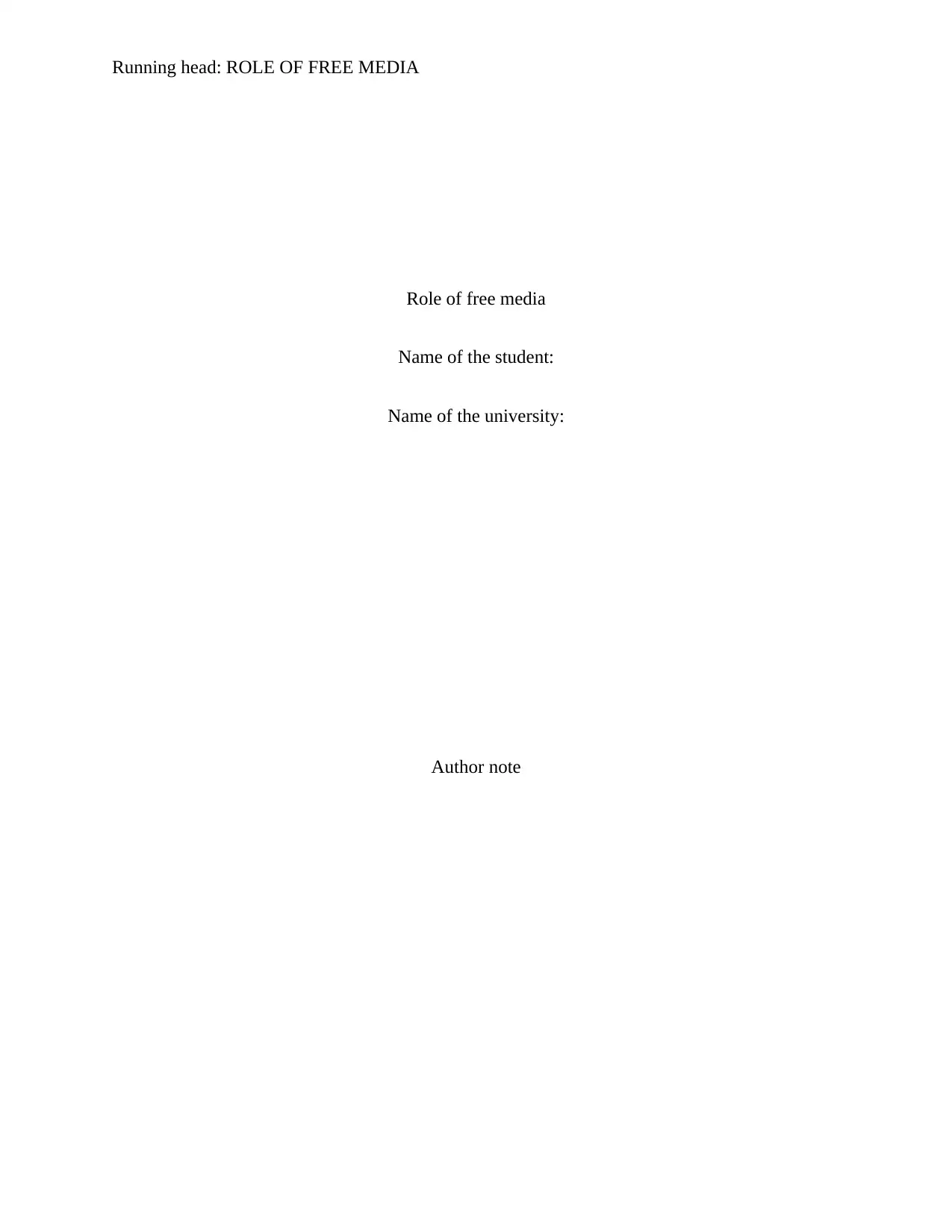
Running head: ROLE OF FREE MEDIA
Role of free media
Name of the student:
Name of the university:
Author note
Role of free media
Name of the student:
Name of the university:
Author note
Paraphrase This Document
Need a fresh take? Get an instant paraphrase of this document with our AI Paraphraser
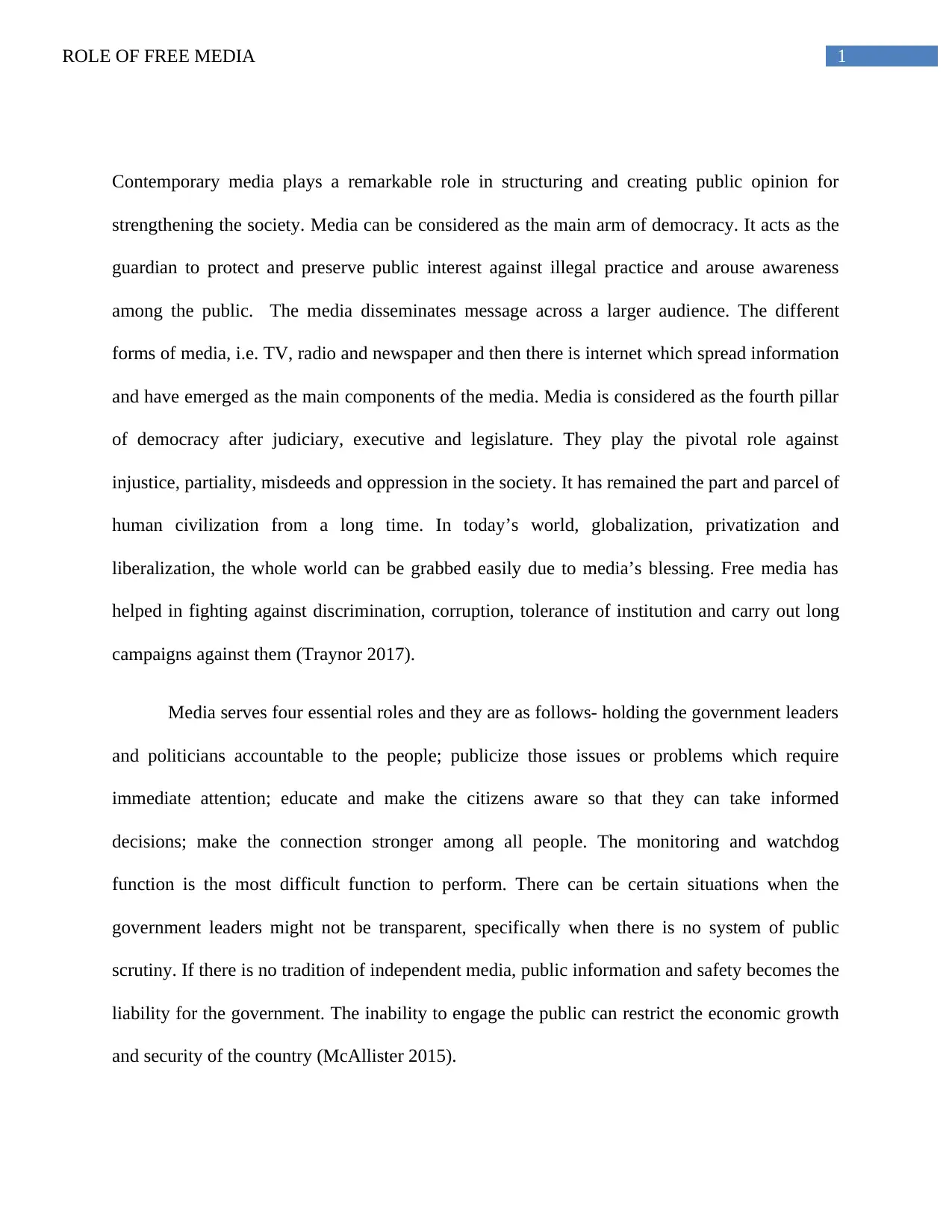
1ROLE OF FREE MEDIA
Contemporary media plays a remarkable role in structuring and creating public opinion for
strengthening the society. Media can be considered as the main arm of democracy. It acts as the
guardian to protect and preserve public interest against illegal practice and arouse awareness
among the public. The media disseminates message across a larger audience. The different
forms of media, i.e. TV, radio and newspaper and then there is internet which spread information
and have emerged as the main components of the media. Media is considered as the fourth pillar
of democracy after judiciary, executive and legislature. They play the pivotal role against
injustice, partiality, misdeeds and oppression in the society. It has remained the part and parcel of
human civilization from a long time. In today’s world, globalization, privatization and
liberalization, the whole world can be grabbed easily due to media’s blessing. Free media has
helped in fighting against discrimination, corruption, tolerance of institution and carry out long
campaigns against them (Traynor 2017).
Media serves four essential roles and they are as follows- holding the government leaders
and politicians accountable to the people; publicize those issues or problems which require
immediate attention; educate and make the citizens aware so that they can take informed
decisions; make the connection stronger among all people. The monitoring and watchdog
function is the most difficult function to perform. There can be certain situations when the
government leaders might not be transparent, specifically when there is no system of public
scrutiny. If there is no tradition of independent media, public information and safety becomes the
liability for the government. The inability to engage the public can restrict the economic growth
and security of the country (McAllister 2015).
Contemporary media plays a remarkable role in structuring and creating public opinion for
strengthening the society. Media can be considered as the main arm of democracy. It acts as the
guardian to protect and preserve public interest against illegal practice and arouse awareness
among the public. The media disseminates message across a larger audience. The different
forms of media, i.e. TV, radio and newspaper and then there is internet which spread information
and have emerged as the main components of the media. Media is considered as the fourth pillar
of democracy after judiciary, executive and legislature. They play the pivotal role against
injustice, partiality, misdeeds and oppression in the society. It has remained the part and parcel of
human civilization from a long time. In today’s world, globalization, privatization and
liberalization, the whole world can be grabbed easily due to media’s blessing. Free media has
helped in fighting against discrimination, corruption, tolerance of institution and carry out long
campaigns against them (Traynor 2017).
Media serves four essential roles and they are as follows- holding the government leaders
and politicians accountable to the people; publicize those issues or problems which require
immediate attention; educate and make the citizens aware so that they can take informed
decisions; make the connection stronger among all people. The monitoring and watchdog
function is the most difficult function to perform. There can be certain situations when the
government leaders might not be transparent, specifically when there is no system of public
scrutiny. If there is no tradition of independent media, public information and safety becomes the
liability for the government. The inability to engage the public can restrict the economic growth
and security of the country (McAllister 2015).
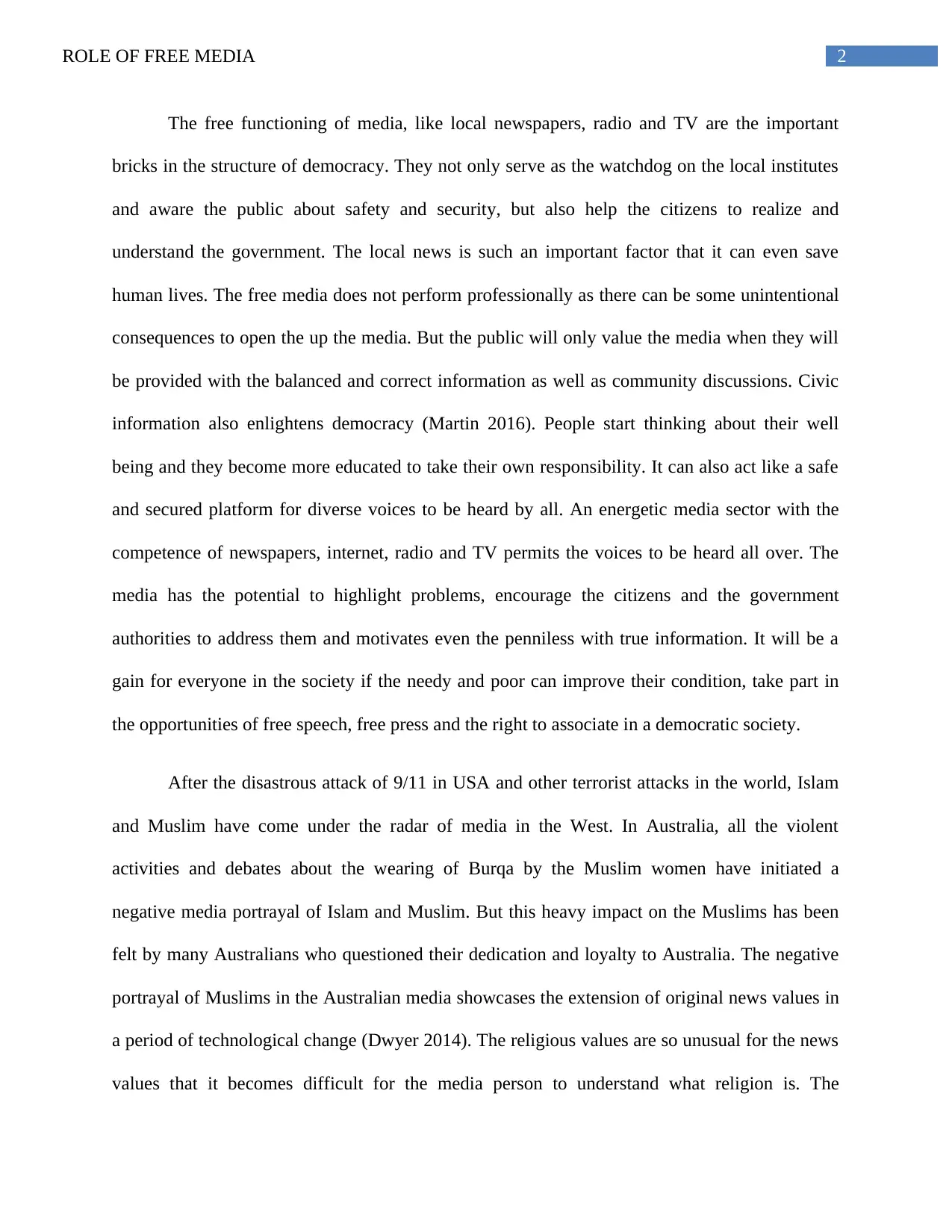
2ROLE OF FREE MEDIA
The free functioning of media, like local newspapers, radio and TV are the important
bricks in the structure of democracy. They not only serve as the watchdog on the local institutes
and aware the public about safety and security, but also help the citizens to realize and
understand the government. The local news is such an important factor that it can even save
human lives. The free media does not perform professionally as there can be some unintentional
consequences to open the up the media. But the public will only value the media when they will
be provided with the balanced and correct information as well as community discussions. Civic
information also enlightens democracy (Martin 2016). People start thinking about their well
being and they become more educated to take their own responsibility. It can also act like a safe
and secured platform for diverse voices to be heard by all. An energetic media sector with the
competence of newspapers, internet, radio and TV permits the voices to be heard all over. The
media has the potential to highlight problems, encourage the citizens and the government
authorities to address them and motivates even the penniless with true information. It will be a
gain for everyone in the society if the needy and poor can improve their condition, take part in
the opportunities of free speech, free press and the right to associate in a democratic society.
After the disastrous attack of 9/11 in USA and other terrorist attacks in the world, Islam
and Muslim have come under the radar of media in the West. In Australia, all the violent
activities and debates about the wearing of Burqa by the Muslim women have initiated a
negative media portrayal of Islam and Muslim. But this heavy impact on the Muslims has been
felt by many Australians who questioned their dedication and loyalty to Australia. The negative
portrayal of Muslims in the Australian media showcases the extension of original news values in
a period of technological change (Dwyer 2014). The religious values are so unusual for the news
values that it becomes difficult for the media person to understand what religion is. The
The free functioning of media, like local newspapers, radio and TV are the important
bricks in the structure of democracy. They not only serve as the watchdog on the local institutes
and aware the public about safety and security, but also help the citizens to realize and
understand the government. The local news is such an important factor that it can even save
human lives. The free media does not perform professionally as there can be some unintentional
consequences to open the up the media. But the public will only value the media when they will
be provided with the balanced and correct information as well as community discussions. Civic
information also enlightens democracy (Martin 2016). People start thinking about their well
being and they become more educated to take their own responsibility. It can also act like a safe
and secured platform for diverse voices to be heard by all. An energetic media sector with the
competence of newspapers, internet, radio and TV permits the voices to be heard all over. The
media has the potential to highlight problems, encourage the citizens and the government
authorities to address them and motivates even the penniless with true information. It will be a
gain for everyone in the society if the needy and poor can improve their condition, take part in
the opportunities of free speech, free press and the right to associate in a democratic society.
After the disastrous attack of 9/11 in USA and other terrorist attacks in the world, Islam
and Muslim have come under the radar of media in the West. In Australia, all the violent
activities and debates about the wearing of Burqa by the Muslim women have initiated a
negative media portrayal of Islam and Muslim. But this heavy impact on the Muslims has been
felt by many Australians who questioned their dedication and loyalty to Australia. The negative
portrayal of Muslims in the Australian media showcases the extension of original news values in
a period of technological change (Dwyer 2014). The religious values are so unusual for the news
values that it becomes difficult for the media person to understand what religion is. The
⊘ This is a preview!⊘
Do you want full access?
Subscribe today to unlock all pages.

Trusted by 1+ million students worldwide
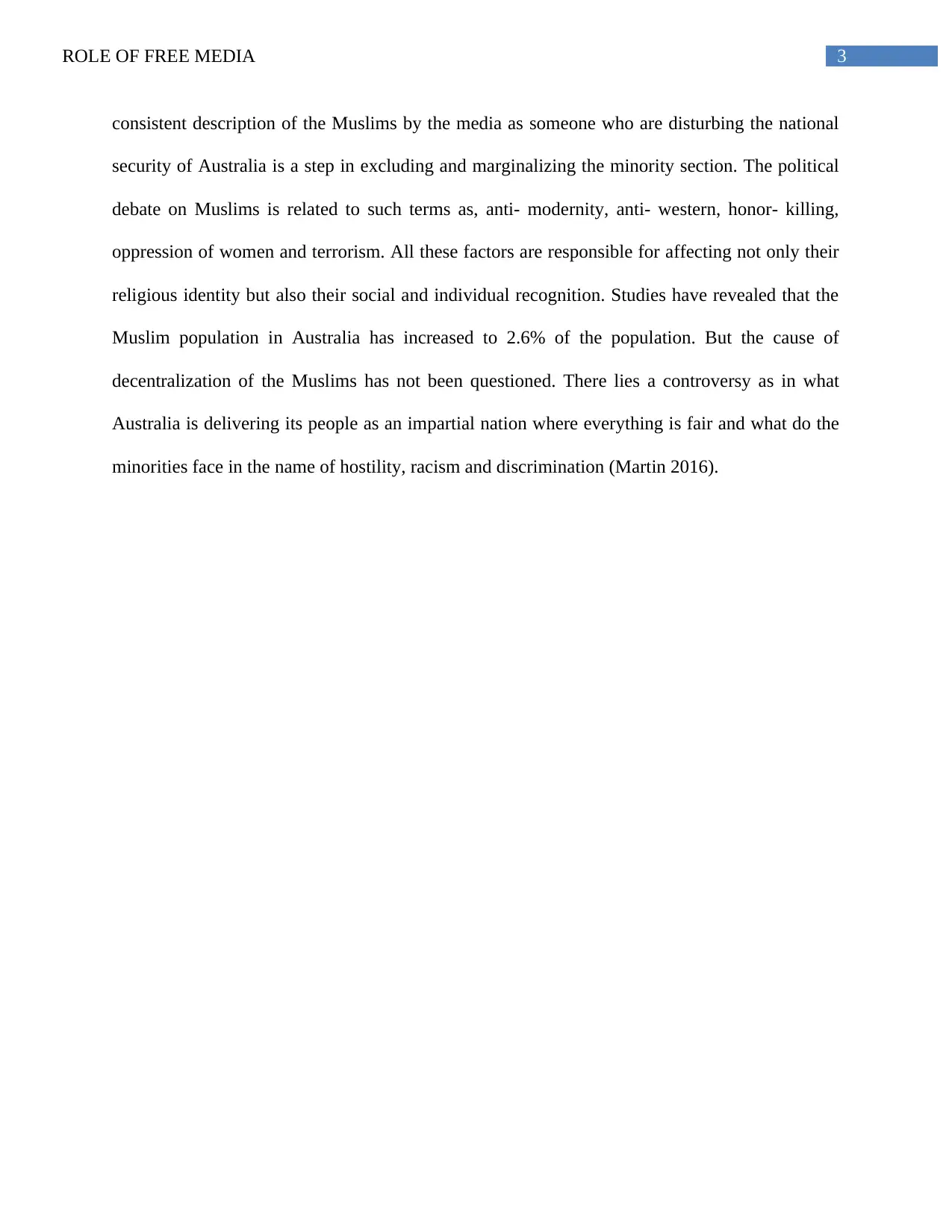
3ROLE OF FREE MEDIA
consistent description of the Muslims by the media as someone who are disturbing the national
security of Australia is a step in excluding and marginalizing the minority section. The political
debate on Muslims is related to such terms as, anti- modernity, anti- western, honor- killing,
oppression of women and terrorism. All these factors are responsible for affecting not only their
religious identity but also their social and individual recognition. Studies have revealed that the
Muslim population in Australia has increased to 2.6% of the population. But the cause of
decentralization of the Muslims has not been questioned. There lies a controversy as in what
Australia is delivering its people as an impartial nation where everything is fair and what do the
minorities face in the name of hostility, racism and discrimination (Martin 2016).
consistent description of the Muslims by the media as someone who are disturbing the national
security of Australia is a step in excluding and marginalizing the minority section. The political
debate on Muslims is related to such terms as, anti- modernity, anti- western, honor- killing,
oppression of women and terrorism. All these factors are responsible for affecting not only their
religious identity but also their social and individual recognition. Studies have revealed that the
Muslim population in Australia has increased to 2.6% of the population. But the cause of
decentralization of the Muslims has not been questioned. There lies a controversy as in what
Australia is delivering its people as an impartial nation where everything is fair and what do the
minorities face in the name of hostility, racism and discrimination (Martin 2016).
Paraphrase This Document
Need a fresh take? Get an instant paraphrase of this document with our AI Paraphraser
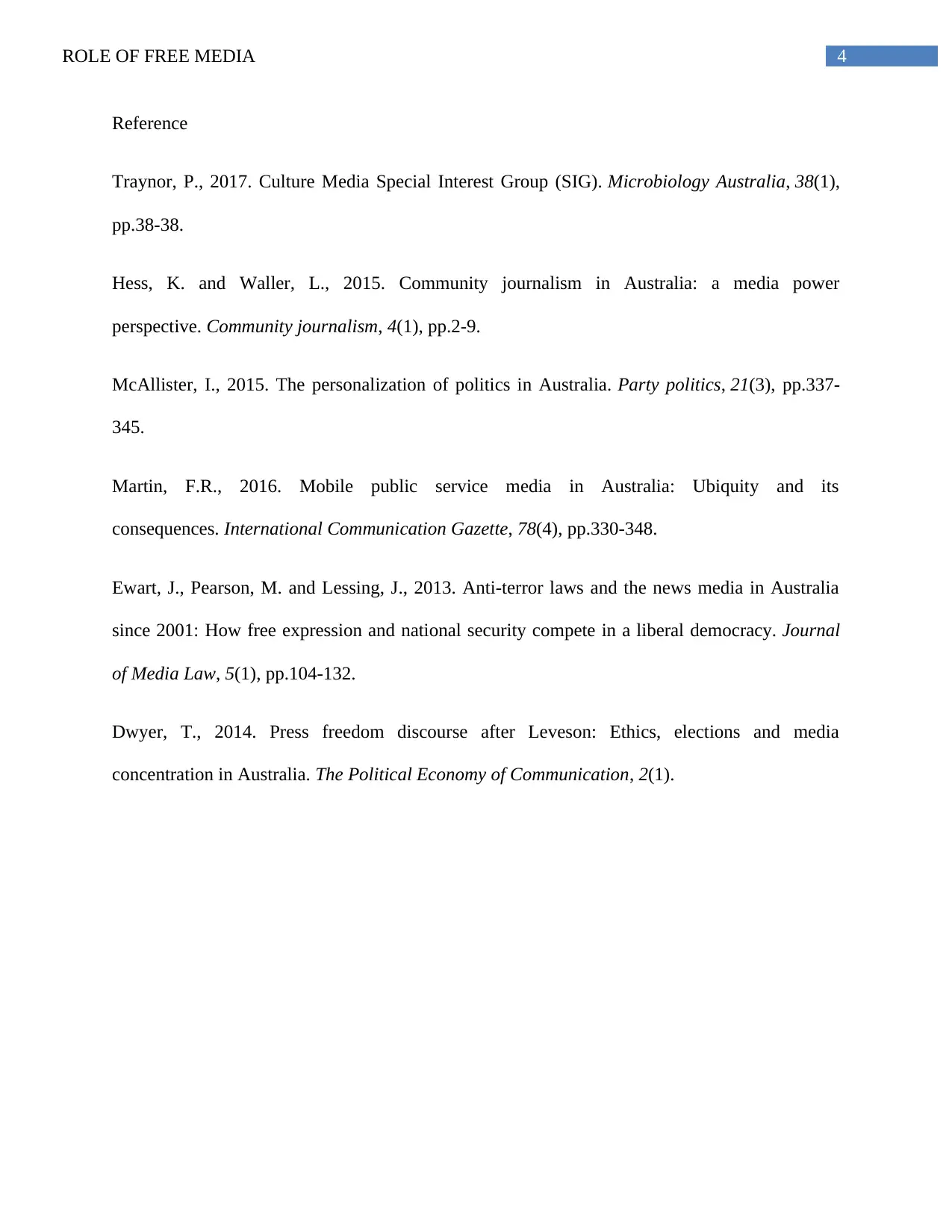
4ROLE OF FREE MEDIA
Reference
Traynor, P., 2017. Culture Media Special Interest Group (SIG). Microbiology Australia, 38(1),
pp.38-38.
Hess, K. and Waller, L., 2015. Community journalism in Australia: a media power
perspective. Community journalism, 4(1), pp.2-9.
McAllister, I., 2015. The personalization of politics in Australia. Party politics, 21(3), pp.337-
345.
Martin, F.R., 2016. Mobile public service media in Australia: Ubiquity and its
consequences. International Communication Gazette, 78(4), pp.330-348.
Ewart, J., Pearson, M. and Lessing, J., 2013. Anti-terror laws and the news media in Australia
since 2001: How free expression and national security compete in a liberal democracy. Journal
of Media Law, 5(1), pp.104-132.
Dwyer, T., 2014. Press freedom discourse after Leveson: Ethics, elections and media
concentration in Australia. The Political Economy of Communication, 2(1).
Reference
Traynor, P., 2017. Culture Media Special Interest Group (SIG). Microbiology Australia, 38(1),
pp.38-38.
Hess, K. and Waller, L., 2015. Community journalism in Australia: a media power
perspective. Community journalism, 4(1), pp.2-9.
McAllister, I., 2015. The personalization of politics in Australia. Party politics, 21(3), pp.337-
345.
Martin, F.R., 2016. Mobile public service media in Australia: Ubiquity and its
consequences. International Communication Gazette, 78(4), pp.330-348.
Ewart, J., Pearson, M. and Lessing, J., 2013. Anti-terror laws and the news media in Australia
since 2001: How free expression and national security compete in a liberal democracy. Journal
of Media Law, 5(1), pp.104-132.
Dwyer, T., 2014. Press freedom discourse after Leveson: Ethics, elections and media
concentration in Australia. The Political Economy of Communication, 2(1).
1 out of 5
Related Documents
Your All-in-One AI-Powered Toolkit for Academic Success.
+13062052269
info@desklib.com
Available 24*7 on WhatsApp / Email
![[object Object]](/_next/static/media/star-bottom.7253800d.svg)
Unlock your academic potential
Copyright © 2020–2026 A2Z Services. All Rights Reserved. Developed and managed by ZUCOL.





